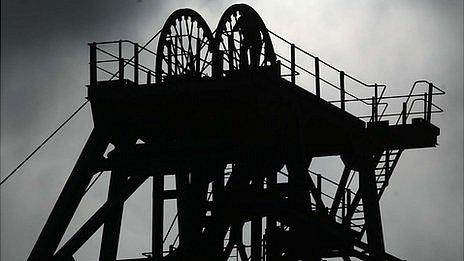Coal mine managers warned of fire risk before huge blaze
- Published

Mining through a fault significantly increases the risk of fire and other hazards
Safety inspectors urged management to close part of a coal mine months before a huge underground fire broke out.
The blaze closed Daw Mill Colliery earlier this year, leaving hundreds of miners out of work and forcing part of the company into administration.
One of the last deep mines in the country, Daw Mill in Warwickshire was owned by UK Coal.
Chief executive Kevin McCullough said he did not believe the company could have prevented the fire.
But the Health and Safety Executive (HSE) and the Union of Democratic Mineworkers said they had warned many months earlier that there were dangers ahead on what is known as the 32s coalface.
"Our advice to UK Coal was they should consider stopping that particular face sooner rather than later, because they were heading for a geological fault," said the chief inspector of mines, Steve Denton.
According to experts, mining through a fault is very dangerous, because it significantly increases the risk of roof collapse, fire and other hazards. One experienced miner described it as "madness".
Despite the warnings, the company decided to continue through the fault, convinced the health and safety risks could be managed.
'Increased risk'
In a series of emails and letters seen by the BBC's File on 4 programme, Health and Safety Executive mine inspectors urged the company to stop mining this area because they were not convinced the risks were being managed properly.
"I remain convinced that early salvage [closure] of this face is essential to minimise risk of serious injury to the workforce," one communication in March 2012 said.
Another refers to a fire in May 2012 on the same coal face.
It concludes the fire was due to "the failure of your risk control measures".
"You were only hours from losing the mine and in order to recover the situation, persons were exposed to increased risk."
No-one was killed as a result of the Daw Mill fire in February 2013, but it was the latest in a series of serious accidents at mines owned by the company.
According to the HSE, eight people died in the space of just five years between 2006 and 2011.
"During that time, there were probably no more than 3,500 employees below ground in UK Coal mines so for eight people to die is just unacceptable in anybody's terms," Mr Denton said.
"It's not excused by the fact that mining is quite a hazardous industry. It's still high, much too high."
Chief executive Kevin McCullough, who joined UK Coal at the beginning of 2013, acknowledged the high death rate was unacceptable. But he did not accept that managers were wrong to continue mining through the fault.
"If the HSE had been sufficiently worried they could have, and perhaps should have, issued a prohibition notice on us not to actually work that face," he said.
"They didn't do that, they were down there inspecting the methods of work literally two or three days before that fire broke out so I was personally satisfied that we were doing all that was reasonable in our risk assessment and approach to mining that face."
The company had been struggling financially before the fire because of competition from cheap imported coal, production problems and a £500m deficit in the company pension scheme.
As a result, it underwent a restructure in December 2012 and a second in July 2013, sending the part of the company which owns Daw Mill into administration with the loss of 350 jobs.
A new company called UK Coal Production Ltd was created to continue running the two remaining deep mines and a series of surface mines.
Listen to the full report on File on 4 on BBC Radio 4 on Tuesday, 23 July at 20:00 BST and Sunday, 28 July at 17:00 BST. Listen again via the Radio 4 website or the File on 4 download.
- Published18 June 2013
- Published17 May 2013
- Published14 September 2012